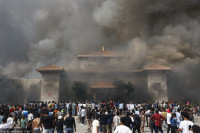Valley
Half of Melamchi waters ‘to be used’ for Bagmati regeneration
Half of the water generated by Melamchi Water Supply Project after completion will be used to regenerate the rapidly-drying Bagmati River as the existing water distribution capacity is inadequate
Gaurav Thapa
Half of the water generated by Melamchi Water Supply Project after completion will be used to regenerate the rapidly-drying Bagmati River as the existing water distribution capacity is inadequate to handle all the water, a senior Urban Development Ministry official said.
The government claims that the first phase of Melamchi project will be completed by April 13, 2016 when it will start pumping 170 million litres of water per day (MLD) from the Melamchi River in Sindhupalchok to the Valley. But the under-construction water treatment plant in Sundarijal, which is scheduled for completion almost simultaneously, has the processing capacity of only 85 MLD.
“Entire 170 MLD water will not be available for distribution immediately,” said Kabindra Karki, assistant spokesperson for the Ministry of Urban Development. “We will release excess water into the Bagmati till we gradually upgrade the treatment plant and distribution network.”
With this, Kathmandu residents will not be able to enjoy as much water, at least in the short term, as expected from Melamchi. According to Narayani Devkota of Galli Galli, a not-for-profit social organisation, the average daily demand for water in the Valley is about 400 MLD. But the Valley’s water supply authority, Kathmandu Upatyaka Khanepani Limited, supplies only around 140 MLD in the rainy season and 80 MLD water in winter. Besides, 36 percent of the water is lost due to leakage which means Valley folks get only about 86 MLD water in the rainy season and about 51 MLD in the dry season, according to Devkota.
Karki said that KUKL’s water distribution network will be overloaded if all 170 MLD water is released at once, urging the people to be patient. It will take five to seven years to complete entire upgradation and therefore water will be released to Bagmati to check wastage, he added. “The water should regenerate Bagmati which is on the verge of drying up.”
Memalchi project officials, however, say the deficit in water treatment capacity can be compensated by overloading the plant. Earlier, Executive Director of Melamchi Water Supply Development Board Ghanashyam Bhattarai had said that despite the plant being designed to process water once every 24 hours, they can extend it to thrice daily to minimise wastage.
But questions remain if the project, which is moving at snail’s pace, will be completed by the scheduled date—which is less than eight months away. Only 40 percent of the pipeline laying work has been completed so far as the KUKL has laid only 288 km of the total required pipeline of 700km for distribution. Construction of six water reservoirs to collect water brought from the Melamchi project is also incomplete.
Though the project was envisioned in the late 1990s, the first agreement of its
construction was signed in 2003 with the funding from various donors and developmental partners. The project was supposed to be completed by 2007.




 5.62°C Kathmandu
5.62°C Kathmandu










